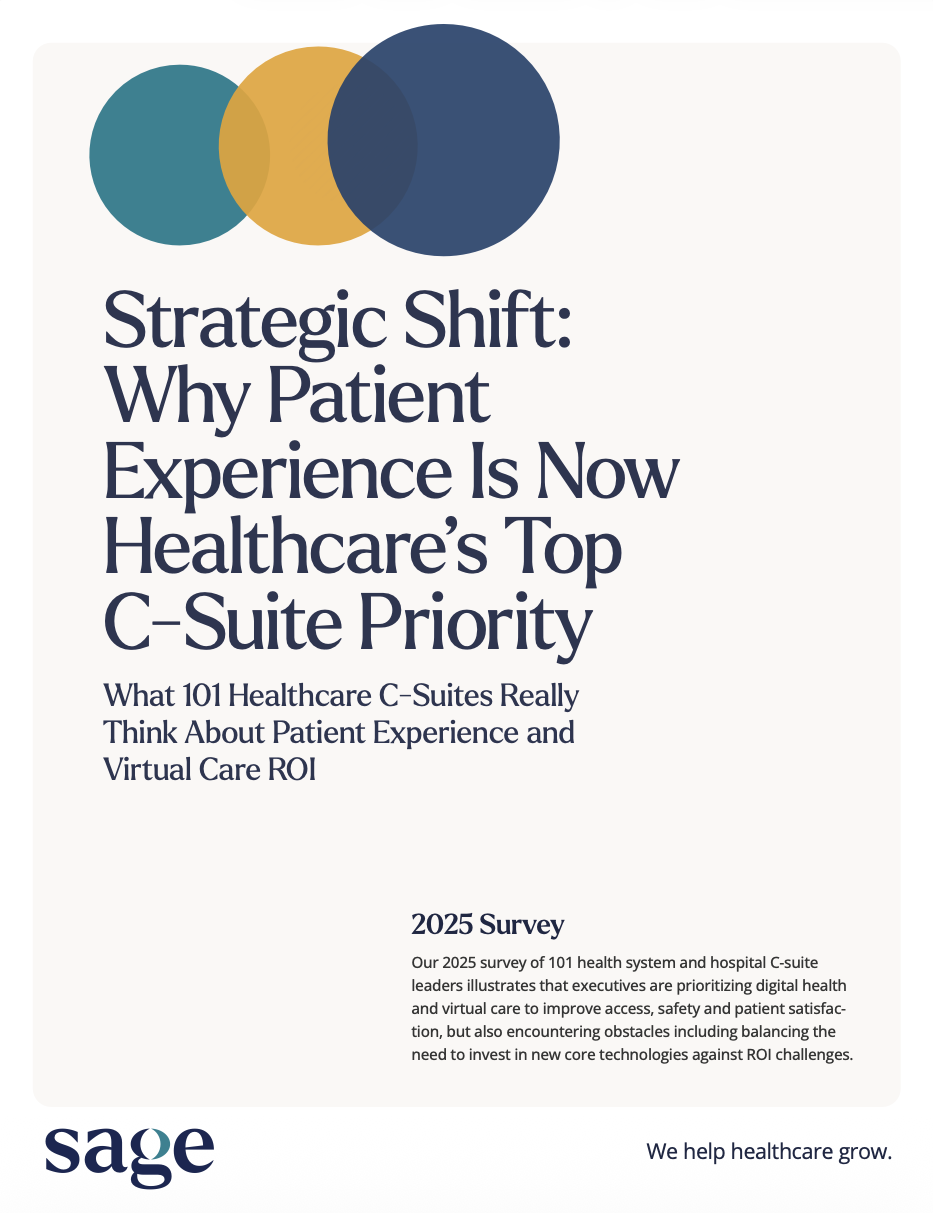The healthcare industry is at a crossroads. While buzzwords like “digital transformation,” “value-based care,” and “AI” dominate conference agendas, what’s actually happening in hospital boardrooms and health system C-suites?
In April 2025, Sage Growth Partners surveyed 101 hospital and health system C-suite executives—including CEOs, CMOs, CIOs, CNOs, COOs, and CFOs—representing organizations of various sizes and types, from community hospitals to integrated delivery networks and academic medical centers. What we found reveals a healthcare industry grappling with rapid change, cautious optimism, and some surprising contradictions.
Here’s a preview of the insights that will be detailed in our upcoming three-part report series. We will release the first report, focusing on AI, in August.
AI: Trending High with Low Trust
Perhaps the most striking finding? Hospital leaders’ relationship with AI has fundamentally shifted. In our last C-suite survey (conducted in late 2023), 36% of respondents ranked AI as the top major trend to watch in healthcare over the next two years. Fast forward to 2025, and 43% see AI as the top trend to watch—with the next-highest top trends falling well behind (remote care at 21% and workforce shortages at 16%). Meanwhile, nearly half of respondents (49%) now rank “appropriate use of AI” as one of their top three challenges facing the U.S. healthcare industry—outranked only by lowering the total cost of care and cybersecurity.
This level of concern illustrates that AI has moved from boardroom speculation to operational reality. Yet here’s the paradox: Almost all (94%) say that AI could impact their strategic initiatives, but only 12% agree that the algorithms and datasets are robust enough to rely on.
What do those strategic initiatives look like? Nearly 80% believe that AI could have a major impact on revenue cycle operations, and the remaining respondents believe it could have at least some impact. About half (53%) said AI has the potential to significantly improve clinical decision-making within their organizations. Improving the patient experience, expanding patient access, reducing workforce burnout, and improving quality scores were other strategic areas where respondents expect a meaningful impact from AI.
But when it comes to implementation, only 10% say they’re aggressively pursuing AI solutions, while 40% are beginning to proactively explore them, and 39% are taking a cautious approach.
The message is clear: Hospital leaders see AI’s potential but are struggling with how to harness it appropriately and safely.
Virtual Care: High Hopes Meet ROI Reality
Virtual care tells a different story—one of implementation gaps and mixed returns. An overwhelming 71% of respondents view integrating virtual care services as moderately to extremely important to their care delivery model. Only 29% consider it unimportant or neutral.
Yet implementation varies dramatically across service types, and many services have yet to be broadly utilized: only 28% offer virtual nursing, 15% offer hospital at home, and just 9% offer virtual ED triage.
Here’s where it gets interesting: the ROI picture also varies wildly by service type. Among organizations offering virtual primary care visits, 78% anticipate improved access and 77% expect better patient satisfaction, yet only about half report actual ROI. RPM shows similar patterns—great expectations for reducing readmissions (58%) and improving patient safety (53%), but again, only about half see ROI.
The standout? Virtual ED triage. Though offered by only about 10% of respondents, an impressive 78% of those organizations report some or significant ROI—the highest among all virtual care categories.
The takeaway: Virtual Care importance is universally acknowledged, but successful implementation and ROI achievement remain elusive for many organizations.
Value-Based Care: The Persistent Status Quo
If AI anxiety has increased and virtual care is evolving, value-based care presents a surprising story: virtual stagnation. Our 2025 data shows remarkably little progress since our November 2023 survey—though that could change soon.
Currently, most organizations have modest VBC revenue exposure: 38% have 5% or less of their revenue tied to value-based care programs, while 27% sit in the 5-10% range. Only 9% have more than 20% of revenue from VBC arrangements.
Despite this low current participation, 77% plan to increase their VBC involvement over the next 1-2 years. This marks a significant shift from November 2023, when over half of respondents had no plans to alter their investment in value-based care models, and only 29% were “aggressively adding value-based care contracts.”
Qualitative insights from our survey takers reveal that the degree of participation in VBC—and interest—still varies significantly across organizations and regions.
“We have been talking about this for 20 years with little meaningful progress,” said one CIO. “Our goals are to stay just involved enough to take advantage of small savings opportunities but still see FFS as the primary revenue driver for the foreseeable future.”
“We’re having multiple conversations with a number of our large players to move to a higher value-based percentage, so we expect that this will change dramatically in the next year or two,” said another chief strategy officer.
The Transformation Paradox
What emerges from this data is a healthcare industry caught between transformation and real-world implementation, between realizing the potential while navigating practical realities. Leaders are simultaneously cautious and optimistic, frustrated with slow progress, yet hopeful about future potential.
AI has rapidly evolved from interesting possibility to urgent challenge. Virtual care has gained acceptance, but struggles with ROI consistency. Value-based care remains stuck in a cycle of good intentions and modest progress.
These aren’t just statistics—they’re the real-world tensions that hospital leaders navigate daily. Understanding these nuances is critical whether you’re a health IT vendor developing solutions, a healthcare provider planning strategy, or an investor evaluating opportunities.
“Leaders understand AI’s potential and its momentum is increasing every day,” said Dan D’Orazio, CEO of Sage Growth Partners. “The organizations that figure out how to identify and implement trusted AI solutions will define the next era of healthcare.”
What’s Next
This preview only scratches the surface of our comprehensive research. Our full three-part report series will dive deep into each area, providing detailed insights, benchmarking data, and strategic recommendations for navigating these complex transformation challenges.
The first report, focusing specifically on AI in healthcare, will be released in August 2025, followed by our virtual care and value-based care reports later this year.
Want to stay ahead of the curve? Sign up below for early release and receive our AI report before anyone else. In today’s rapidly evolving healthcare landscape, having access to real market intelligence from C-suite peers isn’t just valuable—it’s essential.
“The data reveals a fundamental shift in how healthcare leaders view digital transformation—it’s no longer a question of ‘if’, but ‘how’ and ‘how fast,'” said Stephanie Kovalick, Chief Strategy Officer at Sage Growth Partners. “We’re seeing a rising sense of urgency around AI adoption, yet organizations are struggling with the practical realities of implementation. The winners in this market will be those who can help healthcare providers navigate the complexity, not just sell them on the vision. Understanding these nuanced perspectives from actual C-suite decision-makers is critical for any vendor or investor looking to succeed in this evolving landscape.”
Sage Growth Partners helps health IT companies successfully market and sell their solutions to hospitals and health plans. This research reflects our ongoing commitment to providing market intelligence that drives strategic decision-making across the healthcare ecosystem.








